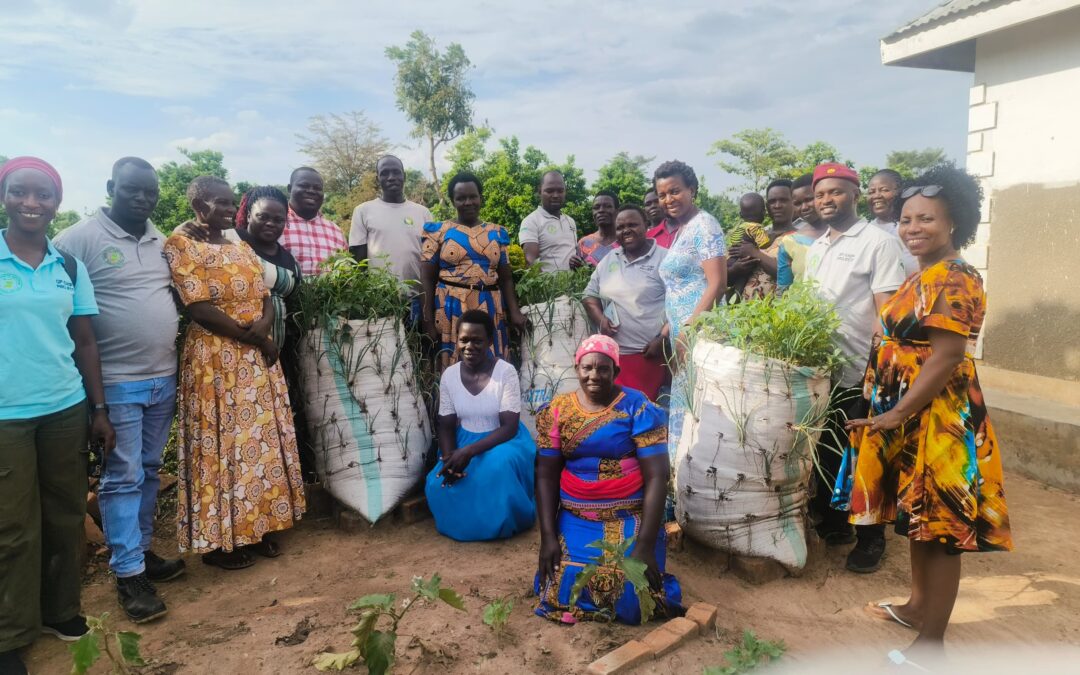The future of agriculture is evolving, and UFAAS’s Agroecology Project is at the forefront of driving the transition. Agroecology offers a promising pathway to ensure efficient use of resources, strengthened resilience, and social justice in agrifood systems.
Farmers in Soroti and Buikwe Districts of Uganda report enhanced awareness about agroecology, increased productivity, more money from the sale of farm output, and improved household gender relations. This was reported during a week-long learning event under the Global Programme for Small-Scale Agroecology Producers and Sustainable Food Systems Transformation (GPSAEP) Project, which took place on 21-26 April 2025. The event brought together implementing partners across the levels of the project at the global level (Global Forum for Rural Advisory Services (GFRAS)), the continental level (African Forum for Agricultural Advisory Services (AFAAS)), the national level (Uganda Forum for Agricultural Advisory Services (UFAAS)), the regional level (master trainers), the community level (rural advisory service facilitators), and implementing partner Access Agriculture.
Implementers interacted with several partner organizations, such as FINASP, Soroti and Buikwe District Local Government, the National Agricultural Research Organisation (NARO) at the National Semi-Arid Resources Research Institute (NASARRI), and farmers. The visits provided an opportunity to share updates on project progress, learn from one another, and explore avenues for strengthening sustainable innovative technologies and approaches.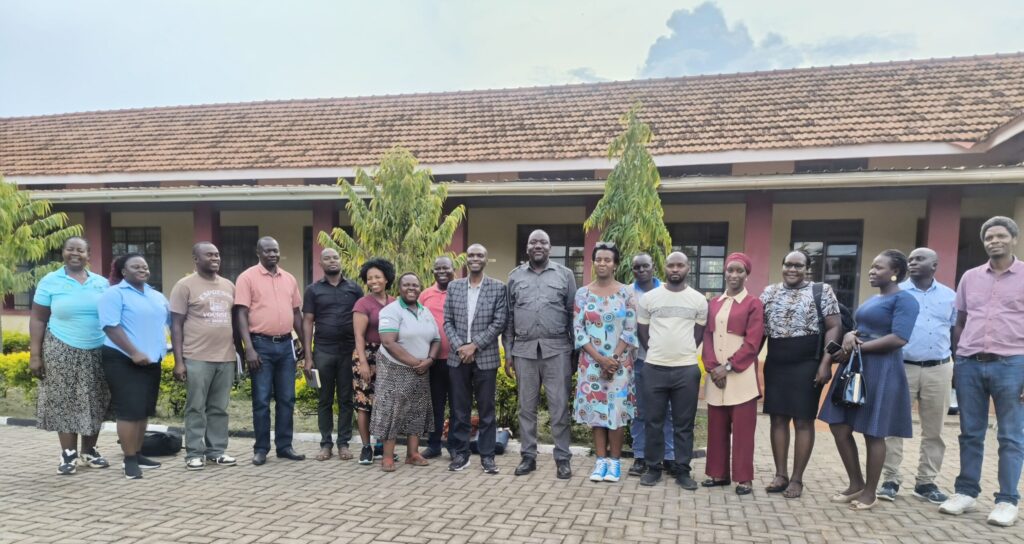
Participants meet with researchers at the NARO-National Semi-Arid Resources Research Institute in Serere.
Insights from the field
In farming communities, implementers observed and learned from several farmers who are transitioning to agroecological practices. Farmers practice various innovations that are not only enhancing food security but also environmentally friendly. They ably explained the ‘whys’ and ‘hows’ of these practices, including:
- Demonstrations on the use of organic fertilizers from locally available materials as eco-friendly alternatives;
- Techniques for creating nutrient-rich compost to enhance soil fertility;
- Circular agricultural systems where crops and livestock complement each other, providing raw materials and reducing waste;
- Push-pull Technology, a pest management strategy that protects crops while supporting biodiversity;
- Sack gardening, a space-efficient gardening method suitable for small-scale producers;
- Farming of alternative livestock feed, such as the black soldier fly;
- Use of energy-efficient cooking stoves; and,
- “Talking homes,”- a concept used where households are visibly exemplary and practice basic agricultural technologies, maintain plastic-free environments, ensure good sanitation, and integrate kitchen and sack gardens.
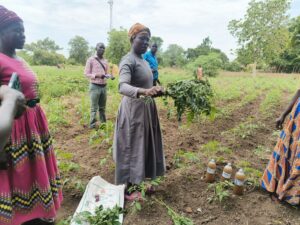
Above: Ms Iyura Grace of Odukai women’s farmer group , Arapai Subcounty, Soroti District (Centre) demonstrates how to make an organic pesticide.
While engaging with farmers, they shared experiences and testimonies of increased productivity, more money from sales of farm outputs, and improved household gender dynamics. In particular, women farmers emphasized that the GPSAEP project had fostered greater participation in group activities and acquisition of knowledge, enabling them to apply the knowledge and get better yields, which increased income and gave them money to meet their own and family needs, ultimately reducing domestic violence, which was previously brought about by dependence on spouses for needs such as school fees.
In all the sites visited, farmers commended the training and facilitation of the rural advisory service facilitators as well as the videos, which contributed to their application of the sustainable technologies into practice. “The extension worker [name mentioned] brought us new knowledge” remarked a farmer in Asuret. [All farmers in the group agreed in unison.]
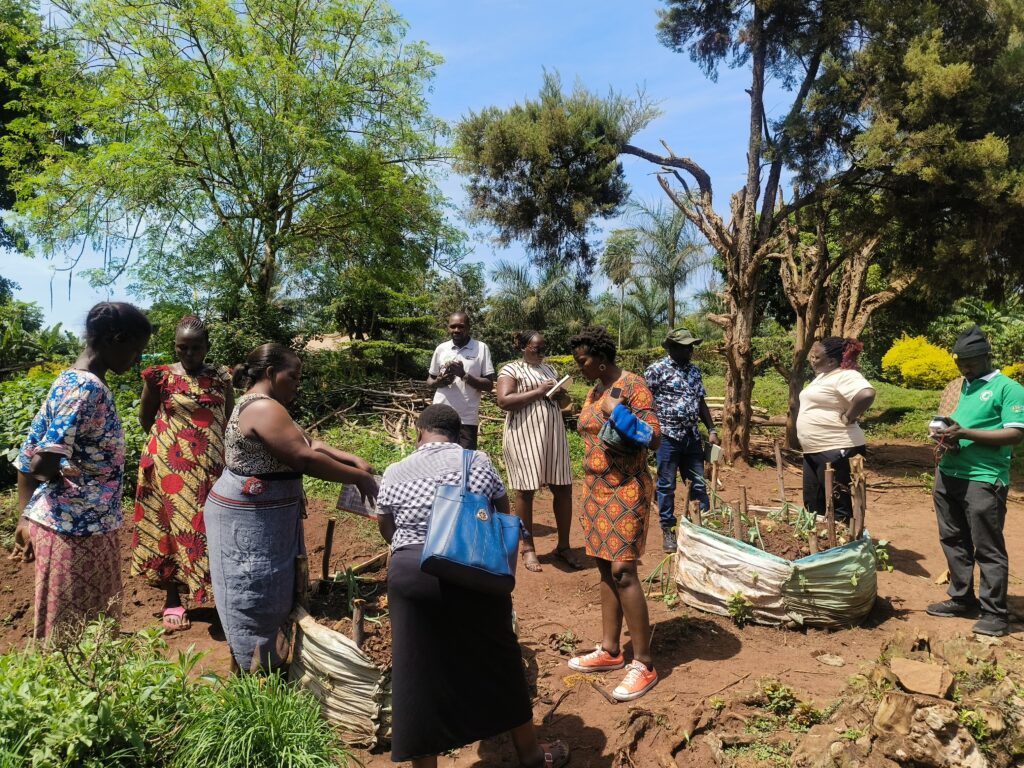
Ms Berna Nakibondo of Tukolerawamu farmers group in Buikwe District (third from the left) shows some of her newly established sack gardens. Bena also rears poultry, zero grazed cows, goats, and grows vegetables. She explained the circular system.
Building capacity, enhancing closer partnerships
Early insights indicate improvements in the confidence and competencies of master trainers and rural advisory service providers to deliver impactful training to farmers. Engagement in the project inspired the majority to enroll for further studies, while others were inspired to choose courses related to agroecology. For example, Isaac Awany after attending the training, decided to choose a graduate course in agroecology.
“Before I attended the GP SAEP training, I wasn’t decided on what post graduate course to study. In mind, I had many courses such as Monitoring and Evaluation , Climate Change, Business administration and Management; but during the training I was inspired by the agroecology content and I also got to know that it covered climate change which I was so much interested in. I then made a decision to enroll for a Masters of Science in Agroecology at Uganda Martyrs University”, said Isaac.
In her remarks, Dr Hlami Ngwenya, the GPSAEP Regional Coordinator at GFRAS, hailed the implementers of the project, appreciated the collaboration with local government, emphasized the relevance of capacity building, and encouraged participants to use and share the New Extensionist Learning Kit (NELK) to enhance capacities on emerging trends. She commended UFAAS for demonstrating that through the GPSAEP project, organizing extension in alternate ways works.
“This project [GPSAEP Project] is not only designed to reach the farmers, but to also build capacities of the extension workers who work with the farmers….you cannot change the life of the farmers if you don’t change the life of the extension worker.” said Dr Ngwenya.
Rural Advisory Services Provider Organizations (RASPOs) and Master trainers alike indicated closer ties with the local government due to joint activities of the project. Master trainers are now integral in the district activities. They attend meetings and supervise related local government activities.
“GPSAEP made our organization [FINASP] more popular not only in communities but also at the District headquarter offices because of the good work we are doing,’ remarked Mr Ousman Owidi, Program Manager at FINASP.
Opportunities beyond the project: The GPSAEP project opened opportunities; for example, one Entrepreneurship for Rural Access agent reported having attracted a partner who offered them smart projectors.
Critical success factors: Discussions with Rural Advisory Services Provider Organizations (RASPOs) highlighted critical success factors for the project, including team commitment, effective targeting of farmers, and progressive intra-household gender relations, such as joint decision-making.
In her closing remarks, Dr. Roselline Nyamutale, the vice chairperson of the UFAAS Board, advised the extension workers to uphold professionalism in the delivery of extension services and leave a positive, lasting legacy in farming communities to contribute to agrifood systems transformation.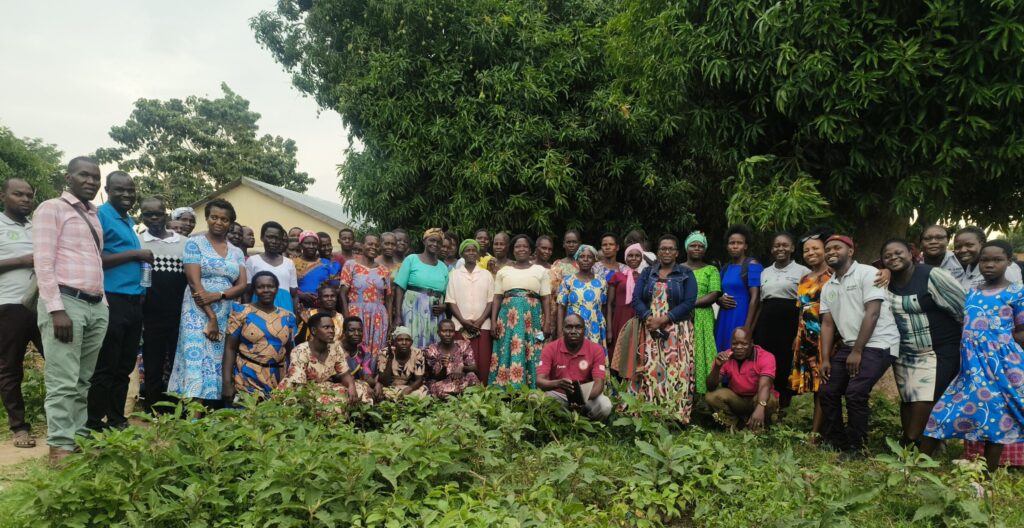
Group photo taken after a discussion with farmer of Asuret Peer Learning Team in Sororti District
About the UFAAS GPSAEP Project:
Funded by the European Union and Belgian Development Cooperation, GPSAEP is structured around four components. Component 1) Improving access to inputs including seeds, bio-inputs and mechanical equipment; Component 2) Increasing value addition and markets for agroecological producers; Component 3) Enhancing Rural Advisory Services (RAS) and farmer-to-farmer joint learning for small-scale producers in transition to agroecology; and Component 4) Improving Economic and Financial Analysis of investments (EFA+) tools to assess the impact and benefit of investments in rural agri-food sector.
UFAAS contributes to Component 3, which targets to increase access to knowledge and empower over 10,000 small-scale farmers in agroecological transition through participatory Rural Advisory Services (RAS) and farmer-to-farmer joint learning.
In Uganda, it is implemented in five districts, namely: Buikwe, Bugiri, Ssembabule, Lira, and Soroti.
Compiled by Elizabeth Asiimwe
For more details, please contact Mrs Beatrice Luzobe, UFAAS CEO on ufaas2013@gmail.com

